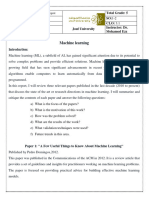0 ratings0% found this document useful (0 votes)
36 viewsBudjacch 07
Budjacch 07
Uploaded by
Muhammad NajeebThe document discusses cultural and gender differences that are important to consider in negotiation and conflict management. It describes various cultural dimensions like time orientation, power distance, and individualism vs collectivism. It also notes differences in how some cultures view time, formality, and context. The document advises being sensitive to such cultural factors to enhance negotiation effectiveness.
Copyright:
© All Rights Reserved
Available Formats
Download as PPT, PDF, TXT or read online from Scribd
Budjacch 07
Budjacch 07
Uploaded by
Muhammad Najeeb0 ratings0% found this document useful (0 votes)
36 views12 pagesThe document discusses cultural and gender differences that are important to consider in negotiation and conflict management. It describes various cultural dimensions like time orientation, power distance, and individualism vs collectivism. It also notes differences in how some cultures view time, formality, and context. The document advises being sensitive to such cultural factors to enhance negotiation effectiveness.
Original Title
budjacch07
Copyright
© © All Rights Reserved
Available Formats
PPT, PDF, TXT or read online from Scribd
Share this document
Did you find this document useful?
Is this content inappropriate?
The document discusses cultural and gender differences that are important to consider in negotiation and conflict management. It describes various cultural dimensions like time orientation, power distance, and individualism vs collectivism. It also notes differences in how some cultures view time, formality, and context. The document advises being sensitive to such cultural factors to enhance negotiation effectiveness.
Copyright:
© All Rights Reserved
Available Formats
Download as PPT, PDF, TXT or read online from Scribd
Download as ppt, pdf, or txt
0 ratings0% found this document useful (0 votes)
36 views12 pagesBudjacch 07
Budjacch 07
Uploaded by
Muhammad NajeebThe document discusses cultural and gender differences that are important to consider in negotiation and conflict management. It describes various cultural dimensions like time orientation, power distance, and individualism vs collectivism. It also notes differences in how some cultures view time, formality, and context. The document advises being sensitive to such cultural factors to enhance negotiation effectiveness.
Copyright:
© All Rights Reserved
Available Formats
Download as PPT, PDF, TXT or read online from Scribd
Download as ppt, pdf, or txt
You are on page 1of 12
Conflict Management
Instructor: Erlan Bakiev, Ph. D.
CONFLICT MANAGEMENT PRENTICE HALL
A Practical Guide to Developing Negotiation Strategies ©2007 Pearson Education, Inc.
By Barbara A. Budjac Corvette Upper Saddle River, NJ 07458
Chapter 7
A Note on Cultural
and Gender Differences
CONFLICT MANAGEMENT PRENTICE HALL
A Practical Guide to Developing Negotiation Strategies ©2007 Pearson Education, Inc.
By Barbara A. Budjac Corvette Upper Saddle River, NJ 07458
Culture
Values, customs, language, rules, tools,
technologies, goods, laws, institutions, and
organizations
CONFLICT MANAGEMENT PRENTICE HALL
A Practical Guide to Developing Negotiation Strategies ©2007 Pearson Education, Inc.
By Barbara A. Budjac Corvette Upper Saddle River, NJ 07458
Classifying Cultures
Time Orientation
Formality
Power Distance
Individualism
Collectivism
Context
CONFLICT MANAGEMENT PRENTICE HALL
A Practical Guide to Developing Negotiation Strategies ©2007 Pearson Education, Inc.
By Barbara A. Budjac Corvette Upper Saddle River, NJ 07458
Cultural Dimensions
Time orientation refers to the focus on time.
Formality refers to pomp and ceremony,
tradition, and formal rules.
Power distance refers to the degree of social
stratification embedded and accepted.
Context refers to the degree to which the
context or situation and individuals affect
behavior and meaning.
CONFLICT MANAGEMENT PRENTICE HALL
A Practical Guide to Developing Negotiation Strategies ©2007 Pearson Education, Inc.
By Barbara A. Budjac Corvette Upper Saddle River, NJ 07458
Cultural Time Orientation
Eastern cultures tend toward a lesser time
focus than do Western cultures.
Cultures more formal than the United States
include Latin America, the Middle East, the
Far East, and Southern Europe.
CONFLICT MANAGEMENT PRENTICE HALL
A Practical Guide to Developing Negotiation Strategies ©2007 Pearson Education, Inc.
By Barbara A. Budjac Corvette Upper Saddle River, NJ 07458
Cultural Power Distance
Countries with relatively high power distance
tolerance include Mexico, South Korea, Japan,
India, Pakistan, Thailand, Argentina, Brazil,
Chile, France, Spain, Italy, Belgium, and
South Africa.
Countries with low power distance include
United States, Great Britain, Canada, Austria,
Finland, Norway, Ireland, Germany, Sweden,
Denmark, and Israel.
CONFLICT MANAGEMENT PRENTICE HALL
A Practical Guide to Developing Negotiation Strategies ©2007 Pearson Education, Inc.
By Barbara A. Budjac Corvette Upper Saddle River, NJ 07458
Cultural Context
Countries where context highly affects
communication—high-context cultures—
include China, Korea, Japan, Vietnam, Arabia,
Greece, Spain, and Italy.
Countries with low-context cultures include
United States, Canada, Germany, Switzerland,
Scandinavia, and Great Britain.
CONFLICT MANAGEMENT PRENTICE HALL
A Practical Guide to Developing Negotiation Strategies ©2007 Pearson Education, Inc.
By Barbara A. Budjac Corvette Upper Saddle River, NJ 07458
Collectivism/Individualism
Collectivist cultures include Japan, Denmark,
and Singapore.
Individualist cultures include Greece,
Germany, Hungary, Egypt, Hong Kong, and
North American countries.
CONFLICT MANAGEMENT PRENTICE HALL
A Practical Guide to Developing Negotiation Strategies ©2007 Pearson Education, Inc.
By Barbara A. Budjac Corvette Upper Saddle River, NJ 07458
Culture and Personality
Development
Emphasis on time may relate to Type A
behavior.
Low-context culture may relate to internal
locus of control.
High-context culture may relate to external
locus of control.
High-context culture may relate to intuiting.
Culture may affect power orientation.
CONFLICT MANAGEMENT PRENTICE HALL
A Practical Guide to Developing Negotiation Strategies ©2007 Pearson Education, Inc.
By Barbara A. Budjac Corvette Upper Saddle River, NJ 07458
Cultural Differences in Negotiating
Cultural sensitivity will enhance negotiation effectiveness.
Expectations, semantics, connotation, and tone are important
and may facilitate or frustrate communication.
Time focus in formal and in high-context cultures may be
insulting.
Spatial boundaries, contact, gift-giving, and dress vary across
cultures.
Goals may vary dramatically between individualistic versus
collectivist cultures.
Face saving is important everywhere!
CONFLICT MANAGEMENT PRENTICE HALL
A Practical Guide to Developing Negotiation Strategies ©2007 Pearson Education, Inc.
By Barbara A. Budjac Corvette Upper Saddle River, NJ 07458
Gender Differences in Negotiation
Men may use language to increase status or
control.
Women may use language for connection.
Men may tend to dominate conversation with
women.
Men underestimate women in negotiation at
their peril!
CONFLICT MANAGEMENT PRENTICE HALL
A Practical Guide to Developing Negotiation Strategies ©2007 Pearson Education, Inc.
By Barbara A. Budjac Corvette Upper Saddle River, NJ 07458
You might also like
- Cross-Cultural Training ProposalDocument41 pagesCross-Cultural Training ProposalRahadian DarujatiNo ratings yet
- MHR405 Chapter 4 NotesDocument17 pagesMHR405 Chapter 4 NotesAhad RizviNo ratings yet
- RCEL Leadership Competency FrameworkDocument6 pagesRCEL Leadership Competency FrameworkFragoso Josué MuhaeNo ratings yet
- Budjacch 06Document11 pagesBudjacch 06Muhammad Najeeb100% (1)
- Pearson Conflict Resolution & NegotiationDocument7 pagesPearson Conflict Resolution & NegotiationḾuhammad Bahauddin QureshiNo ratings yet
- Curs 3 CM - 2022 ConflictDocument11 pagesCurs 3 CM - 2022 ConflictannameyNo ratings yet
- Budjacch 03Document13 pagesBudjacch 03Muhammad NajeebNo ratings yet
- Effects of Power in NegotiationDocument12 pagesEffects of Power in NegotiationMuhammad NajeebNo ratings yet
- CM 4Document16 pagesCM 4Ioana CiobicaNo ratings yet
- CH 2Document14 pagesCH 2Huzaifa Ali Khan100% (1)
- Chap 7 A Note On Cultural and Gender DifferenceDocument11 pagesChap 7 A Note On Cultural and Gender DifferenceMarium HasanNo ratings yet
- Communication in NegotiationDocument10 pagesCommunication in NegotiationGoutham ReddyNo ratings yet
- CVPsample 1Document20 pagesCVPsample 1Shobe JorolanNo ratings yet
- As It Relates To Keeping Students Connected To Their School: Understanding PovertyDocument36 pagesAs It Relates To Keeping Students Connected To Their School: Understanding PovertyAnonymous LLPo7M1GONo ratings yet
- Budjacch 05Document13 pagesBudjacch 05Manal Al AlawiiNo ratings yet
- FOY Resume 2010 Summer - For BLOGDocument1 pageFOY Resume 2010 Summer - For BLOGshirahedenNo ratings yet
- CE Week 9 Session 1 - Cross-Cultural CommunicationDocument10 pagesCE Week 9 Session 1 - Cross-Cultural CommunicationmoliqinghongsiNo ratings yet
- T ChartDocument3 pagesT Chartoghood304No ratings yet
- Communication Accross CulturesDocument24 pagesCommunication Accross CulturesMelinda SilorioNo ratings yet
- Poverty, Middle Class and Wealth Perspectives Ruby PayneDocument5 pagesPoverty, Middle Class and Wealth Perspectives Ruby PayneAlekseyNo ratings yet
- LU4 - Communication Challenges in A Diverse, Global MarketplaceDocument37 pagesLU4 - Communication Challenges in A Diverse, Global Marketplacejpr12345No ratings yet
- 2019 Diversity, Equity, & Inclusion (DEI) Action PlanDocument14 pages2019 Diversity, Equity, & Inclusion (DEI) Action PlanninaNo ratings yet
- Chapter 2 Dimension of CultureDocument56 pagesChapter 2 Dimension of Culturehòa phanNo ratings yet
- HBM339 Lecture 2aDocument17 pagesHBM339 Lecture 2aiamshitNo ratings yet
- Group1 Team4 AustraliaDocument12 pagesGroup1 Team4 Australiashubhamdubey3066No ratings yet
- The Essence of Cross-Cultural Communication Has More ToDocument15 pagesThe Essence of Cross-Cultural Communication Has More ToYASHASVI SHARMANo ratings yet
- Coaching and Judging Youth Public Speaking Competitions: CongratulationsDocument7 pagesCoaching and Judging Youth Public Speaking Competitions: CongratulationsArchana ShaktawatNo ratings yet
- PDF CCDocument29 pagesPDF CCdebjyoti77No ratings yet
- Chapter1 - Second PartDocument16 pagesChapter1 - Second PartAli Gökay BozokNo ratings yet
- Competitive AnalysisDocument8 pagesCompetitive Analysisbragadireanu cristinaNo ratings yet
- Managing Socio-Cultural DiversityDocument18 pagesManaging Socio-Cultural DiversityarchishagargNo ratings yet
- Managing Socio-Cultural DiversityDocument18 pagesManaging Socio-Cultural DiversityarchishagargNo ratings yet
- Managing Socio-Cultural DiversityDocument18 pagesManaging Socio-Cultural DiversityarchishagargNo ratings yet
- Social, Cultural and Demographic Environment of BusinessDocument33 pagesSocial, Cultural and Demographic Environment of Businessrohitkool11No ratings yet
- Fostering A Culture of Straight TalkDocument18 pagesFostering A Culture of Straight TalkIgnacio CárdenasNo ratings yet
- Success and Failures For ExpatriatesDocument25 pagesSuccess and Failures For ExpatriatesAli zizoNo ratings yet
- (Chapter 4) The Cultural Environment of Intl. BusinessDocument78 pages(Chapter 4) The Cultural Environment of Intl. BusinessPatrice MarandaNo ratings yet
- Christopher J Choi Resume 10-31-17Document1 pageChristopher J Choi Resume 10-31-17api-405909313No ratings yet
- Campaign and Advicacy2Document24 pagesCampaign and Advicacy2hrei1627No ratings yet
- SlideDocument20 pagesSlideShivanth Raj PandayNo ratings yet
- Multicultural & Global CommunicationDocument11 pagesMulticultural & Global CommunicationKhushboo MadaanNo ratings yet
- ITM v1Document38 pagesITM v1sobia.jamilNo ratings yet
- M02 Communicating in The Digital Age Workplace 2Document28 pagesM02 Communicating in The Digital Age Workplace 2No NameNo ratings yet
- Meanings and Dimensions of CultureDocument40 pagesMeanings and Dimensions of Culturerathna johnNo ratings yet
- Session 5Document17 pagesSession 5shreykapoor009No ratings yet
- Cross-Culture Communication and NegotiationDocument18 pagesCross-Culture Communication and NegotiationAru BhartiNo ratings yet
- Chapter 2 Cultural EnvironmentDocument24 pagesChapter 2 Cultural EnvironmentJo MalaluanNo ratings yet
- Session 5b - Hofstede's DimensionsDocument15 pagesSession 5b - Hofstede's DimensionsANIKET SURNo ratings yet
- Contemporary World Understanding The Structure of The SocietyDocument30 pagesContemporary World Understanding The Structure of The SocietySarah GNo ratings yet
- Etiquette SPP TDocument9 pagesEtiquette SPP TLog InNo ratings yet
- IPC 7 CultureDocument25 pagesIPC 7 Culturehowiee0730No ratings yet
- Worksheet #5 Local and Global Communication - DomingoDocument1 pageWorksheet #5 Local and Global Communication - DomingoNICA MIKAELA DOMINGONo ratings yet
- PURPOSIVE COMMUNICATION Chapter 2 - GEC107Document18 pagesPURPOSIVE COMMUNICATION Chapter 2 - GEC107Liza LimtuacoNo ratings yet
- Gender and Development Report 2017Document39 pagesGender and Development Report 2017Eunice Basario100% (3)
- Hofstede's DimensionDocument10 pagesHofstede's DimensionGolam MostofaNo ratings yet
- Excellence in Business Communication: Thirteenth Edition, Global EditionDocument36 pagesExcellence in Business Communication: Thirteenth Edition, Global Editionjuan aristoNo ratings yet
- Culture and International MarketingDocument30 pagesCulture and International MarketingFarid FauziNo ratings yet
- Resume 2010Document1 pageResume 2010shirahedenNo ratings yet
- Estate Planning for the Healthy, Wealthy Family: How to Promote Family Harmony, Affirm Your Values, and Protect Your AssetsFrom EverandEstate Planning for the Healthy, Wealthy Family: How to Promote Family Harmony, Affirm Your Values, and Protect Your AssetsNo ratings yet
- NOBLE LEADERSHIP IN THE EMERGENT REALITY: UPLIFTING People, Planet and ProsperityFrom EverandNOBLE LEADERSHIP IN THE EMERGENT REALITY: UPLIFTING People, Planet and ProsperityNo ratings yet
- Diversity Equity & Inclusion for OrganizationsFrom EverandDiversity Equity & Inclusion for OrganizationsRating: 3 out of 5 stars3/5 (1)
- SBP Imports by Selected CountriesDocument5 pagesSBP Imports by Selected CountriesMuhammad NajeebNo ratings yet
- Personal Mastery - The Fifth Discipline PDFDocument1 pagePersonal Mastery - The Fifth Discipline PDFMuhammad NajeebNo ratings yet
- Team Learning: Senge: Chapter 12Document58 pagesTeam Learning: Senge: Chapter 12Muhammad NajeebNo ratings yet
- Shared Vision (SV) : The Fifth DisciplineDocument27 pagesShared Vision (SV) : The Fifth DisciplineMuhammad NajeebNo ratings yet
- Senge FD Chapter 9Document27 pagesSenge FD Chapter 9Muhammad NajeebNo ratings yet
- Personal Mastery: Concepts and Methods From Peter Senge'sDocument21 pagesPersonal Mastery: Concepts and Methods From Peter Senge'sMuhammad NajeebNo ratings yet
- School Leadership & Management: Formerly School OrganisationDocument21 pagesSchool Leadership & Management: Formerly School OrganisationMuhammad NajeebNo ratings yet
- Personal Mastery: The First Discipline of Learning Organizations by Marty Jacobs Published in The October 2007 Issue of Vermont Business MagazineDocument4 pagesPersonal Mastery: The First Discipline of Learning Organizations by Marty Jacobs Published in The October 2007 Issue of Vermont Business MagazineMuhammad NajeebNo ratings yet
- Ben Zvi Assaraf2010Document28 pagesBen Zvi Assaraf2010Muhammad NajeebNo ratings yet
- Closed Branches (Updated As of 13 5 2020) PDFDocument4 pagesClosed Branches (Updated As of 13 5 2020) PDFMuhammad NajeebNo ratings yet
- 2334 96381202057M PDFDocument7 pages2334 96381202057M PDFMuhammad NajeebNo ratings yet
- Exemption Application Form PDFDocument2 pagesExemption Application Form PDFMuhammad NajeebNo ratings yet
- Nearest Atm 2 Nearest Atm 1 List of Non-Operational AtmsDocument2 pagesNearest Atm 2 Nearest Atm 1 List of Non-Operational AtmsMuhammad NajeebNo ratings yet
- A Case Study in The Mental Models and Mental-Logic Debate: Conditional SyllogismsDocument37 pagesA Case Study in The Mental Models and Mental-Logic Debate: Conditional SyllogismsMuhammad NajeebNo ratings yet
- Najeeb Other Business ModelDocument13 pagesNajeeb Other Business ModelMuhammad NajeebNo ratings yet
- ISQ List of Reference Books PDFDocument4 pagesISQ List of Reference Books PDFMuhammad NajeebNo ratings yet
- giáo án anh 6- ISW-unit 6- (tuyết)Document44 pagesgiáo án anh 6- ISW-unit 6- (tuyết)nganbt.238tNo ratings yet
- Bharat Engineering Enterprises (EXERCISE)Document2 pagesBharat Engineering Enterprises (EXERCISE)Nihal YnNo ratings yet
- Systems Analysis and Design: Determining System RequirementsDocument36 pagesSystems Analysis and Design: Determining System RequirementsSatya NadellaNo ratings yet
- The Lok Bharti Group: One Stop Solution For All Your Learning NeedsDocument39 pagesThe Lok Bharti Group: One Stop Solution For All Your Learning NeedsKetan BhatejaNo ratings yet
- BSBADM502 Erdenechimeg Jamsranjav - Avti200153Document36 pagesBSBADM502 Erdenechimeg Jamsranjav - Avti200153Chemka ChemkaNo ratings yet
- Maths Class X Sample Paper Test 13 For Board Exam 2024Document6 pagesMaths Class X Sample Paper Test 13 For Board Exam 2024Mamta shettyNo ratings yet
- Online Presentation ToolDocument17 pagesOnline Presentation ToolPaige KimNo ratings yet
- 9TH - Class Fundamentals of Business CommunicationDocument17 pages9TH - Class Fundamentals of Business CommunicationMiliNo ratings yet
- The Nature of Research: Mcgraw-HillDocument21 pagesThe Nature of Research: Mcgraw-HillSiti Najiha A RahimNo ratings yet
- Effects of Senior SecondaryDocument8 pagesEffects of Senior Secondaryjerry simonNo ratings yet
- Folktale TraditionDocument15 pagesFolktale TraditionChrist Church BoysNo ratings yet
- MIL Q2 Module 5Document28 pagesMIL Q2 Module 5MICHAEL JIMENONo ratings yet
- Living in A Country Where You Have To Speak A Foreign Language Can Cause Serious Social Problems, As Well As Practical ProblemsDocument5 pagesLiving in A Country Where You Have To Speak A Foreign Language Can Cause Serious Social Problems, As Well As Practical ProblemsDu NamNo ratings yet
- 2.3 DqacDocument3 pages2.3 DqacAvinash KumarNo ratings yet
- Certificate ProgrammesDocument112 pagesCertificate Programmesdansymon83No ratings yet
- Sally and The Leaves Sally and The Leaves MondayDocument5 pagesSally and The Leaves Sally and The Leaves Mondayapi-451201960No ratings yet
- Worksheets Pencil Case Answers v2Document2 pagesWorksheets Pencil Case Answers v2LilianaPereiraNo ratings yet
- Lifetrap DefinitionsDocument6 pagesLifetrap DefinitionsmikefixNo ratings yet
- Speech Communication Made Simple: Teacher's ManualDocument61 pagesSpeech Communication Made Simple: Teacher's ManualAldo Jose Zeas CastroNo ratings yet
- Nooranita Bte Kamaruddin V Faeiz Bin Yeop Ahmad, (2007) 4 SHLR 97Document9 pagesNooranita Bte Kamaruddin V Faeiz Bin Yeop Ahmad, (2007) 4 SHLR 97Harris DanielNo ratings yet
- La Paro and Gloeckler 2016Document9 pagesLa Paro and Gloeckler 2016basusumpitaNo ratings yet
- Notification Revised Mop-Up 22.08.2019 Final 7.38 PMDocument2 pagesNotification Revised Mop-Up 22.08.2019 Final 7.38 PMNaveen DhakaNo ratings yet
- Tips - Learning at The Museum Frontiers PDFDocument246 pagesTips - Learning at The Museum Frontiers PDFMirtes OliveiraNo ratings yet
- Qrs Sib RPDFDocument3 pagesQrs Sib RPDFapi-344635191No ratings yet
- Annals of Tourism Research: Derek Bryce, Senija Čaušević TDocument14 pagesAnnals of Tourism Research: Derek Bryce, Senija Čaušević Thcu805No ratings yet
- Oracle User Adoption ServicesDocument38 pagesOracle User Adoption ServicesHaitham Ezzat100% (1)
- Huv Quiz QuestionsDocument5 pagesHuv Quiz QuestionsdhanushNo ratings yet
- Grammar - Tenses - 1 CourseDocument3 pagesGrammar - Tenses - 1 CourseАліна ГуляйгродськаNo ratings yet
- Machine Learning Papers ReportDocument5 pagesMachine Learning Papers ReportAbadNo ratings yet









































































































